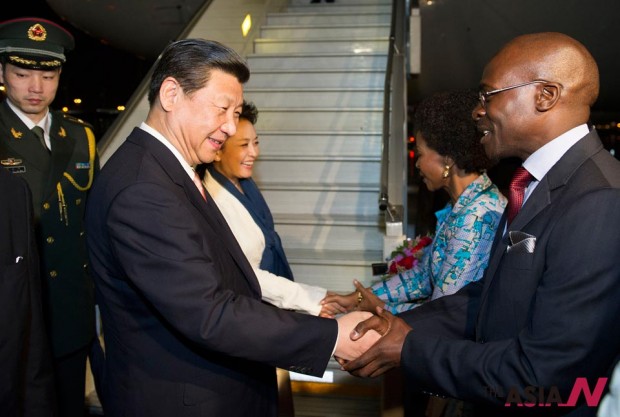China expands influence in Africa on the back of Xi Jinping’s trip

Chinese President Xi Jinping (front, L) and his wife Peng Liyuan (back, L) are welcomed by South African Minister of International Relations and Cooperation Maite Nkoana-Mashabane (back, R) and Minister of Public Enterprises Malusi Gigaba (front, R) at the Tambo International Airport of Johannesburg, South Africa, March 25, 2013. Xi arrived in South Africa Monday for a state visit to promote bilateral ties and for a summit of the BRICS countries. (Photo : Xinhua/NEWSis/Huang Jingwen)
China is set to enhance its fast expanding political influence in Africa by taking a pro-active role in mediating disputes in the resource-rich continent as new Chinese PresidentXi Jinping returned home from a high-profile African tour.
While Xi has committed billions of dollars in assistance on his tour to Tanzania, South Africa and Congo, he told African leaders that China would be taking up a larger role in Africa, where a number of countries are bogged down with a host of internal disputes.
“China will actively participate in the mediation and solving of hotspot issues in Africa and encourage Chinese enterprises to expand their investments in Africa,” the ruling Chinese Communist Party-run Global Times quoted Xi as telling a meeting of African leaders in Durban.
Xi’s well-choreographed first visit abroad with his charismatic wife Peng Liyuan days after taking over as President starting with Russia and African countries besides attending the BRICS summit in Durban, already won him a statesman-like image back home as he met leaders of over dozen countries including Prime Minister Manmohan Singh in one go during his maiden overseas tour that lasted ten days.
This is perhaps for the first time that China has shown interest in taking up a larger role in complex African political scenario, other than expanding its trade which is close to USD 200 billion.
A number of African leaders met Xi, also General Secretary of the ruling Communist Party, on the sidelines of the recent BRICS summit.
Summing up Xi’s visit to Africa, Chinese Foreign Minister Wang Yi told the media that the Chinese President sent a clear message to the international community that China and Africa have been “a community of shared destinies,” and they will forever be reliable friends and sincere partners.
Wang said for their part the African leaders dismissed fears of “Chinese neo-colonialism” in Africa, saying the China-Africa cooperation was aimed at mutual benefits and win-win results.
During his visit, Xi witnessed the signing of more than 40 cooperation agreements, including documents on large-scale projects for improving the livelihood of the African people.
The deals included a USD 10 billion port in Tanzania and USD five billion telecom deal in South Africa.
Xi also announced a host of measures to support Africa, including increasing assistance to the continent and expanding China-Africa cooperation in finance and human resources.
Xi stressed China would keep every commitment made to Africa, both in letter and spirit, and would attach no political strings in the process, so as to help African nations translate their advantages in natural resources into advantages in development and to help them achieve diversified, independent and sustainable development.
The fifth BRICS summit, which brought together leaders of Brazil, Russia, India, China and South Africa, has promoted unity among major emerging economies and injected fresh impetus into the cooperation mechanism. The meeting in Durban marked the first time that the high-profile annual gathering had come to Africa.
At the summit, Xi expounded on China’s view on the future direction, principles and areas of BRICS cooperation, and called for the establishment of a global development partnership among the five major emerging economies, Wang Yi said.
The Chinese leader looked forward to deepened cooperation among the BRICS countries on an integrated market for trade and investment, financial and monetary affairs, transportation links, and cultural and people-to-people exchanges.
The leaders agreed to set up a BRICS development bank, a Contingent Reserve Arrangement(CRA), a business council and a think tank council. They also reached broad consensus on jointly dealing with major global and regional issues, reforming the international monetary and financial systems, and promoting the cause of the global development. <Compiled from multiple news reports>
























































